#yes they’re doomed by the narrative. yes I’m jealous.
Text
writing a Part 1 CSM fic where everyone’s just hanging out, but I can’t work on it for too long or it makes me sad and lonely and a little hopeless because. at least they have each other and an apartment/home and know how to make food lmao.
#but also I can’t stop working on it because my coping mechanism of choice is escapism#vicious cycle#yes they’re doomed by the narrative. yes I’m jealous.#sometimes a clear-cut lack of agency is enviable compared to being told you have agency when. it’s severely limited/not respected/etc#(woah just like in Chainsaw Man)#I don’t want to fall into nihilism because at the end of the day I think we still have free will and can make choices/changes#but it’s on a pretty small level. which is why community and collaboration are so important!#fuck capitalism#I’m so hungry and tired all the goddamn time. I wish I enjoyed/was good at making food.#considering joining a meal subscription service because this shit is bananas#food mention#csm#my csm thoughts#meposting#csm fic#I’m hoping to post it soon. I crave validation.#idk what to expect though. haven’t been part of a rly popular fandom in a while (both /pos and /neg)#chainsaw man#I like how it’s turning out! my writing has always felt a bit barebones but. it’s a good foundation at least!
2 notes
·
View notes
Text
The Universe Doesn’t Give a Shit About You

You know, one thing that has become seriously irritating nowadays, is this whole “the universe is doing something for you” shtick, that’s apparently become the latest favorite new age meme, currently making it’s rounds on the internets. Take a look at this stuff.
(A variety of examples are shown.)
And that’s just a small sampling. And this isn’t just a case of a few isolated incidents. This type of sentiment is everywhere now; seemingly having become all the rage among many aspiring spiritual truth seekers.
“Depressed? Cheer up. The universe is horny for you!”
By first appearances, making references to the universe seems to reflect a more scientifically based position, although, I don’t think these seekers really mean it in a scientific way. Essentially, these new age universe worshippers are just former theists, who probably finally realized the complete absurdity of that position, and so now, have shifted their heels over to pantheism; that is, a doctrine which identifies god with the universe, or regards the universe as a manifestation of god; which is basically a veneration of nature. And, as we all know, mother nature is pretty much a cold, predatory, discriminating bitch; so I’m not sure why anyone would associate nature with a benevolent god.
I know, god loves you so much, he allows evil to rack you to the core on purpose. It’s a test, right? It’s all part of his divine plan. God just wants to see if you will curse his name when he makes times get incredibly tough. It’s a Job type of deal. He’s forcing you into a position of struggle and suffering, all so he can wage a bet with the devil over whether or not you will be disobedient. Isn’t that just so cool of him? Now you get to show god just how loyal and subservient you are to him, despite all the abuses he hurls at you! That’s such an enviable position! The one true god loves you so much, he tortures you as a demonstration of just how much you worship and obey him. That’s what love is. And just think of how lucky you are! He picked *you* as a guinea pig in his twisted self aggrandizing experiment! He chose YOU! This would make such a great reality TV show!
Heaven and Hell productions, presents...
“The God Fucks Me Factor.”
Ah yes, it would be, so nice. Because god takes great pride in your blind obedience, you know. And he’s a very jealous god, if you can believe it. So what’s going on inside your head is of supreme importance him! You must think that you believe in him, then confess it with thy lips, and then go down, and perform some lip service on the godhead. You should show great pride in being a slave. It’s a feather in god’s cap. And now, can be more fully realized with the advent of pantheism. It’s theism, with a pan. It’s pantheism.
Famous 17th century Dutch philosopher Baruch Spinoza was really captivated by the idea of pantheism, and his many philosophical contemplations on the subject is largely responsible for ushering the position into modern day prominence. Pantheists do not celebrate a distinct personal or anthropomorphic god, but rather, accept all gods into worship, because they view god as everything. An ideological stance that can become quite problematic, to say the least.
Throughout history, pantheism has been a belief system that, in one form or another, tended to be the most common default faith practice among the many various indigenous peoples from around the globe. It’s the same ideologic methodology that the pagans of Europe used to practice; that is, before Rome came along and forced Christianity deep down into every person’s every available orifice. And you should always keep this historical fact in the forefront of your mind. Your Abrahamic belief system is the result of a Roman soldier raping someone’s great great great great grandma and grandpa with a big middle eastern theological strap-on dildo. Don’t you ever forget that. Your whole modern day spiritual life was originally founded on a theological psych-rape. Your precious sacred religion was passed down to you through your family being raped. And it’s no coincidence that Rome, an arrogant empire dead-set on conquering the entire world, found Christianity to be quite compatible with their grandiose ambitions. And that should tell you something about the core fabric of the Abrahamic cult religions.
So, pantheists believe that god is everything. All inclusive, with no exceptions. No standards or filter necessary. This includes every kind of concept; even the stupid ideas and majestic fantasies, floating around inside our heads. And this also includes every kind of object or person to have ever existed, no matter who or what they are. This means they are ALL god, whether it be a virus, a parasite or an infectious bacteria, whether it be a machine gun, cocaine or a dildo, whether John Wayne Gacy, the unabomber or Adolf Hitler, they are all but different forms of an ambiguous enigmatic god! He’s so complex, you can’t even fathom him. He’s got value and purpose so profoundly beyond your puny logic, you can’t even question him.
And not only is every kind of object or person a manifestation of god, but guess what? With pantheism, ALL the different gods, are god as well. It’s not that some gods are valid, and some gods are not, or that maybe all gods are completely full of shit, no! In fact, it actually quite the opposite, I’m afraid. Now, all different gods are actually the one same god. Every so called “god” is graciously welcomed into pantheism with open arms. Whether Yahweh, Zeus, Horace, or the great honorable bull testicle god, all of them are just different manifestations of the one same god!
Yeah. You know, when it gets right down to it, I don’t have any issue with the whole “god is everything”, bullshit, but, uh, to say the least, I think these concepts might be just a little *too* inclusive for most of the population’s tastes. They’re simply not palatable to their delicate tongue’s tender sensibilities, and they therefor much more prefer to perform oral worship on a single god head. Who am I to stop them?
But the concept of a universe is just so much better then a god, isn’t it? Yeah. It’s a better false substitution. The idea of the universe as a higher power is more soothing then the idea of a god as a higher power. This particular surrogate for the truth is just so much more secure and comforting. But in the end, it’s the same exercise. The idea that something ELSE in the field of perception is the responsible agent. In fact, most of this pantheism business just seems to be a matter of replacing the word “god” with the word “universe”, and calling this a new ideological position. Are you confused? Well, worry not! I will gladly give you a little taste, and bestow upon you three prime examples.
Quote:
“Never trust anyone completely but God. Love people, but put your full trust only in God.”
Lawrence Welk.
Nice. Which now becomes:
“Never trust anyone completely but the universe. Love people, but put your full trust only in the universe.”
Quote:
“Never lose an opportunity of seeing anything beautiful, for beauty is God’s handwriting.”
Ralph Waldo Emerson.
Sweet. But could also be stated:
“Never lose an opportunity of seeing anything beautiful, for beauty is the universe’s handwriting.”
Quote:
“Man has to start with something and then develop it - he cannot ever make anything from nothing, only God can do that, and call forth the creation.”
Margaret Weston.
Awesome. But let’s not overlook:
“Man has to start with something and then develop it - he cannot ever make anything from nothing, only the universe can do that, and call forth the creation.”
See how it works? Just about any dialogue about god could still hold water when replacing the word “god” with “the universe.” So it’s really not all that much of a novel position. It’s just a convenient one-size-fits-all philosophical cure-all. An ideological placebo. And I’m not one who is much impressed by Dues Ex philosophy, which is what any type of theology basically is, including pantheism.
For those of you not familiar with the term, “Dues Ex”, it is derived from the term “Dues Ex Machina”, a Greek phrase, which translated means, “a god from a machine”, and is usually employed as a literary device, wherein an explicitly complex seemingly intractable problem in a plot narrative is suddenly inexplicably solved by the addition of an unexpected character, object or situation. Think the eagles coming to save Frodo from uncertain doom in the fiery volcano of Mordor. Basically, it’s a cheap fast way to tie up the loose ends of a difficult quandary. It’s ideological laziness, and quite frankly, has no place in philosophy, in much the same way that theism has no place in philosophy.
And by the way, speaking of the “a god from the machine” thought experiment, it reminds me that, when it comes to gods and machines and ghosts and men, philosophers have gotten the whole thing all wrong all along. A god may emerge from a machine, but if it does, bear in mind that both the god and the machine are equally sourced from the pure mind. And this is the part people just can’t seem to understand. Though-out history, philosophers have always deeply contemplated the idea of “a ghost in the machine”, but that’s because most philosophers think they are a physical creature living in a physical environment. But it’s a huge lie. There is no ghost in the machine. What you actually have, is a machine in the ghost; as, there is no such thing as physicality, and a “deterministic mechanical universe”, is just an abstraction. What you call “physicality”, is a denser mental state; and to attribute this mind-space into an idea of objective locality is just plain falsehood. It’s just plain wrongheaded.
And it doesn’t matter if you include the “self”, as god, because this “self”, is still an attribution. The egoic character that you’ve associated an identity with, isn’t a self, so this is still in the same realm of falsehoods. Illusion is everything on the screen of perception; including the physical body, and all it’s supposed psycho-biological properties. Wherein is any universe?
So that’s pantheism; which, I’m not all that partial towards, due to it’s attributional psychology, which shares the same central backbone as orthodox religion. Why would it be any different with pantheism? The responsibility is still elsewhere, hence the power is elsewhere also; so it matters not that you’ve replaced an anthropological deity with celestial chemistry. Same excrement, different poop chute. And that’s the same reason why, that if a truth seeker were to take a purely scientific position considering the universe, it wouldn’t be all that much different then a theist or a pantheist viewpoint.
“How’s that?”
That’s right, Charlie. As previously stated, a purely cosmological scientific viewpoint; that is, the idea of the universe as some grand cosmic physical context of exterior space consisting of a mixture of different objects and chemistries, is just that: an idea. In other words, also completely full of shit. There is no “universe”, existing, anywhere. And that’s why, the universe doesn’t give it a shit about you. There’s no vibrating strings out there governing some law of attraction that brings forth metaphysical emergent properties when you energetically match a frequency. No. What you really have, is just an IDEA of a universe, which is not really located in a space-time continuum, but, only imagined as a location in a mind-space continuum.
If you can understand this basic fundamental, then you may have finally grasped one of the basic truths of reality.
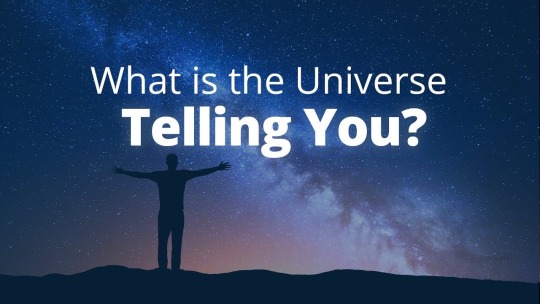
8 notes
·
View notes
Text
Fantastic Four Vol. 1 Annual 1976
Special thanks to @maxwellelvis for taking most of this one off my hands!
Mon Aug 12 2019
[09:46 PM] maxwellelvis: Okay. This is that Event I told you about.
[09:46 PM] Wack'd: You tell me about a lot of Events
[09:48 PM] Wack'd: Man it's weird that the Fantastic Four have a Danger Room
[09:48 PM] Aleph Null: yes but you can't fuck this one
[09:48 PM] Wack'd: If this were the 80s and 90s when suddenly the X-Men were the next big thing and people were bending over backwards to make the Fantastic Four fit that mold, sure
[09:48 PM] Wack'd: Here in the 70s it's just weird
[09:49 PM] Wack'd: God this is such a mom joke
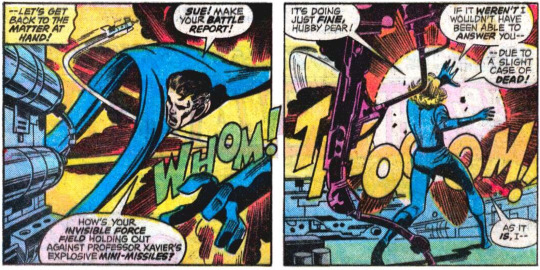
[09:50 PM] Wack'd: A running gag that's gone unacknowledged as of late is Ben interrupting Reed before he can finish his technobabble
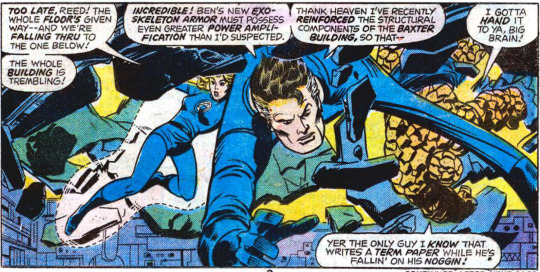
[09:51 PM] Wack'd: It's always hard to know spur of the moment what's worth pointing out and what isn't, until suddenly you realize that a pattern has been continuing for like six issues and you haven't said anything
[09:51 PM] Umbramatic: rip
[09:52 PM] Wack'd: Reed didn't you build a robot to fix things for this express purpose?
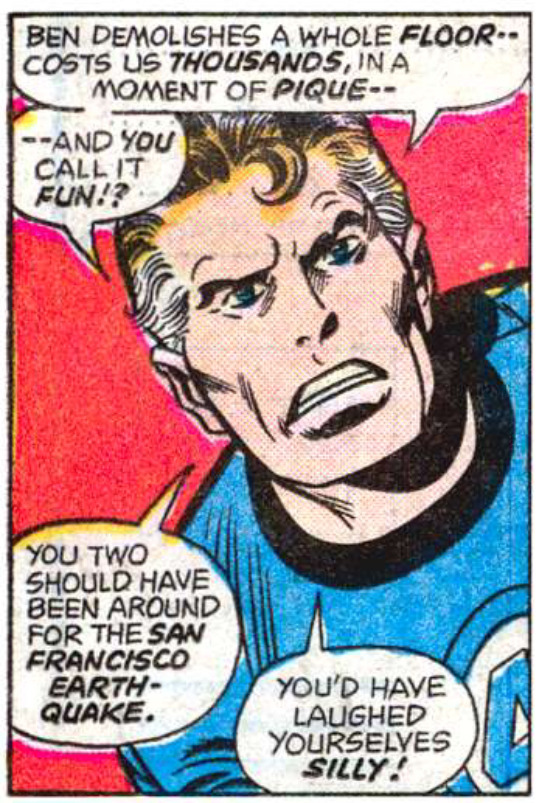
[09:52 PM] Wack'd: You did, way back in #119!
[09:53 PM] Wack'd: Roy Thomas remembers 1962 better than he remembers his own damn issues
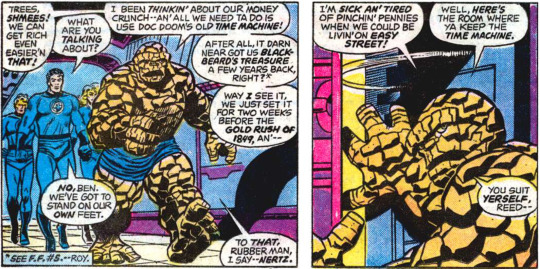
[09:54 PM] Wack'd: "Wait a minute! You guys are Nazis!"
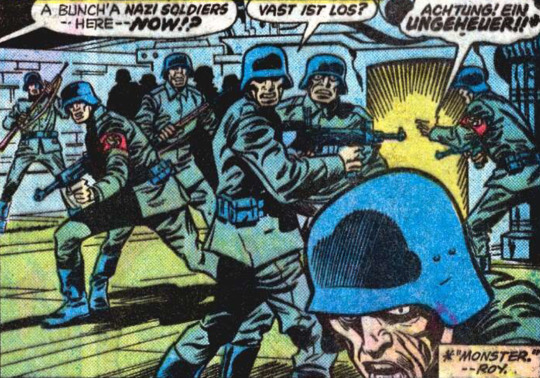
[09:55 PM] Umbramatic: KILL THE NAZIS KILL THE NAZIS
[09:55 PM] maxwellelvis: *Venture Bros music*
[09:56 PM] Wack'd: I don't think you are going to be embarrassed. Not because these guys are Nazis but because beating up Nazi cosplayers is still a good thing to do
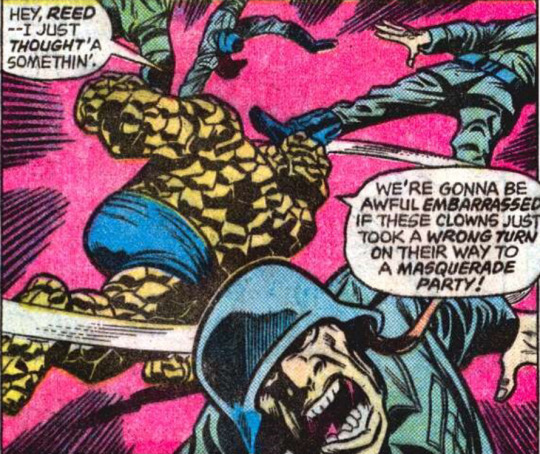
[09:57 PM] Wack'd:
Sue: Why are these men still fighting World War II more than three decades after it ended?
Johnny: You might as well ask the Late Late Show the same thing, Sue.
[09:57 PM] Wack'd: Johnny confirmed for a big fan of Irish television
[09:58 PM] Umbramatic: pffft
[09:59 PM] maxwellelvis: I've got my 2-in-1 TPB with me so I can read this along with you.
[09:59 PM] Wack'd: AND NOW THE RESOLUTION OF A PLOTHOLE THAT HAS BEEN BOTHERING PEOPLE FOR YEARS
[10:00 PM] Wack'd: Yes, Doom did take his time machine back. Reed just copied the blueprints first and then made a new one
[10:00 PM] Wack'd: Problem solved
[10:00 PM] Umbramatic: oh my
[10:01 PM] Wack'd: Anyway, Reed is started to learn that the Nazis came from 1946 London. Willing to bet this is something to do with the vibranium that fell in there
[10:01 PM] maxwellelvis: You skipped over the part where, when Reed and Sue first start puzzling out how the heck these guys got here, the next page shows Ben just WAILING on one of the troops and yelling at him for making his friends all upset.
[10:02 PM] Wack'd: I skip over a lot of things if they insufficiently amuse me or aren't relevant to any particular narrative
[10:02 PM] maxwellelvis: "Now see whatcha gone an' done, Otto? You got my ol' buddy here upset an' I ain't even hit ya yet."
[10:02 PM] maxwellelvis: I know, but I just found that amusing.
[10:04 PM] Wack'd: So the Watcher shows up but is doing his damndest not to interfere after having been put on trial over in Captain Marvel
[10:05 PM] Wack'd: *siiiiiigh* Okay, guess we're doin' this
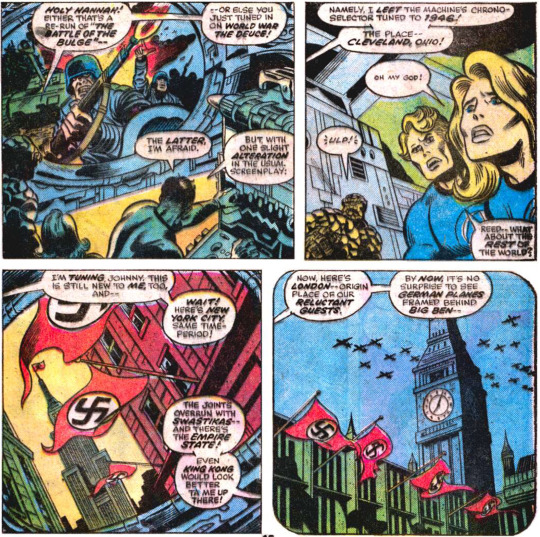
[10:05 PM] Wack'd: I hate "what if the Nazis won" stories that don't account for the historical reality that these guys were kind of dipshits
[10:05 PM] Wack'd: I hate them so much
[10:05 PM] Wack'd: THEY DIDN'T EVEN WANT TO CONQUER THE UNITED STATES
[10:06 PM] maxwellelvis: Yeah, but these are comic book Nazis, remember that.
[10:06 PM] Aleph Null: not now max
[10:06 PM] maxwellelvis: Shutting up
[10:07 PM] Umbramatic: oh great the one way you could make Cleveland worse
[10:07 PM] Wack'd: Thomas knows juuuuuuust enough history to irritate me
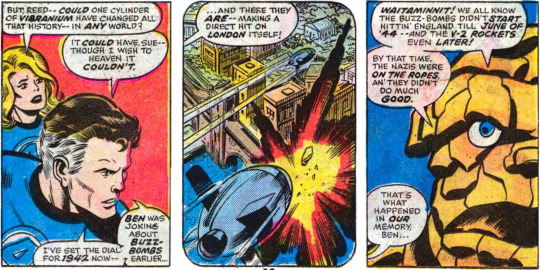
[10:07 PM] Aleph Null: LMAO
[10:07 PM] Larena: People like to pretend the Nazis were these tactical geniuses but they really fucking weren't
[10:09 PM] Wack'd: Seriously Thomas knows the Lee/Kirby lore better than he knows his own
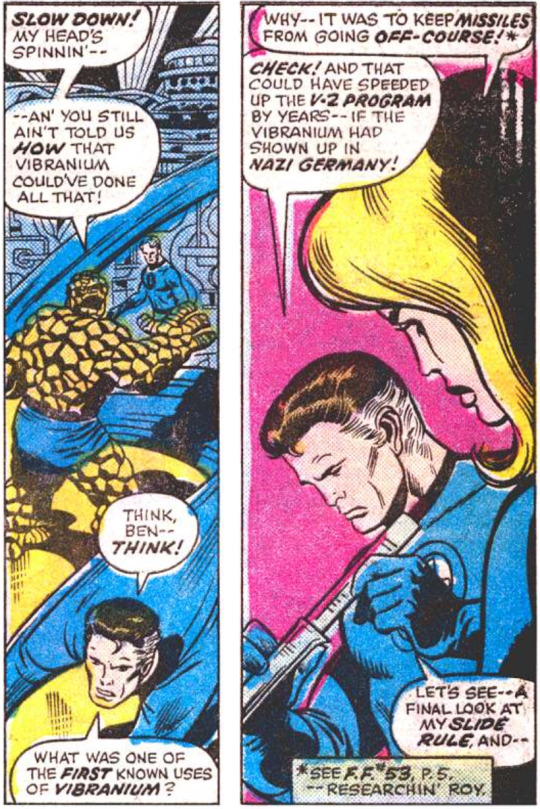
[10:09 PM] Umbramatic: heck
[10:09 PM] Wack'd: Also, all the long-range missiles in the world aren't going to change their lack of tactical proficiency, or Ally advantages, or the fact that the ground war was going poorly...
[10:10 PM] Wack'd: Whatever, the longer I complain about this the longer this issue lasts
[10:10 PM] Wack'd: Watcher, satisfied Reed has cracked this, vanishes, and the Four head off into the past
[10:12 PM] maxwellelvis: Smack-dab in the middle of a strategy planning session being overseen by THE INVADERS in London HQ. They're planning a raid of Castle Wolfenstein--sorry, Castle Cherbelle.
[10:12 PM] Umbramatic: lel
[10:13 PM] Wack'd: Hey Max? I know you're enjoying having the issue on hand but if I have to wait for you to say things it's gonna drag this out and, as mentioned, I'm not super into this one
[10:13 PM] maxwellelvis: Sorry
[10:13 PM] Wack'd: Anyway yeah, what he said
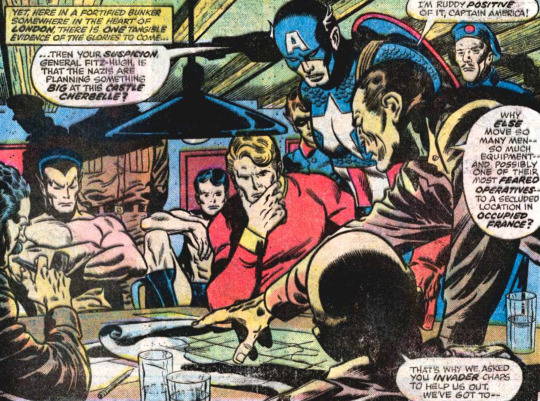
[10:14 PM] Wack'd: ...actually...do you wanna do this issue for me? And I'll just put relevant images where needed
[10:14 PM] maxwellelvis: Sure.
[10:14 PM] Wack'd: Thanks!
[10:14 PM] maxwellelvis: So the inevitable fight happens.
[10:14 PM] maxwellelvis: Some things of note:
[10:14 PM] maxwellelvis: Namor is a hotheaded dick no matter what decade it is
[10:14 PM] Wack'd:
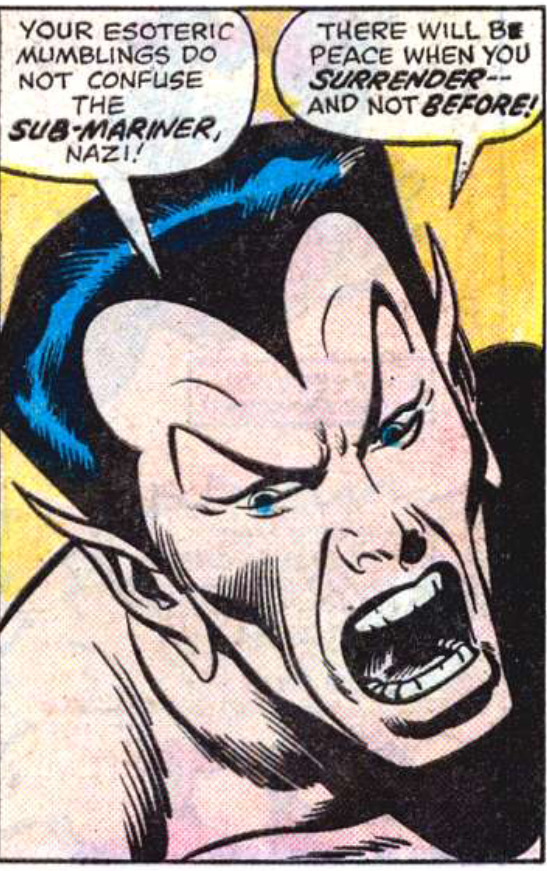
[10:15 PM] maxwellelvis: Powerless or no, I feel like Namor calling Ben a Nazi would result in him being ripped limb from limb
[10:15 PM] Wack'd: Hint that Ben is Jewish #354
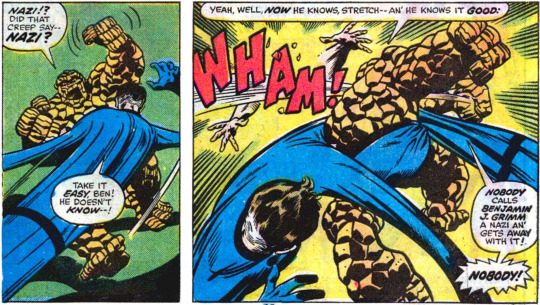
[10:15 PM] maxwellelvis: Johnny is rather awestruck to see the Original Human Torch and Toro, and just barely manages to parry their last volley of fireballs
[10:16 PM] maxwellelvis: Bucky is useless as always
[10:16 PM] maxwellelvis: and Cap almost immediately realizes that the smart thing to do is to break up this little ballroom blitz.
[10:16 PM] Wack'd: THE WINTER SOLDIER EVERYONE
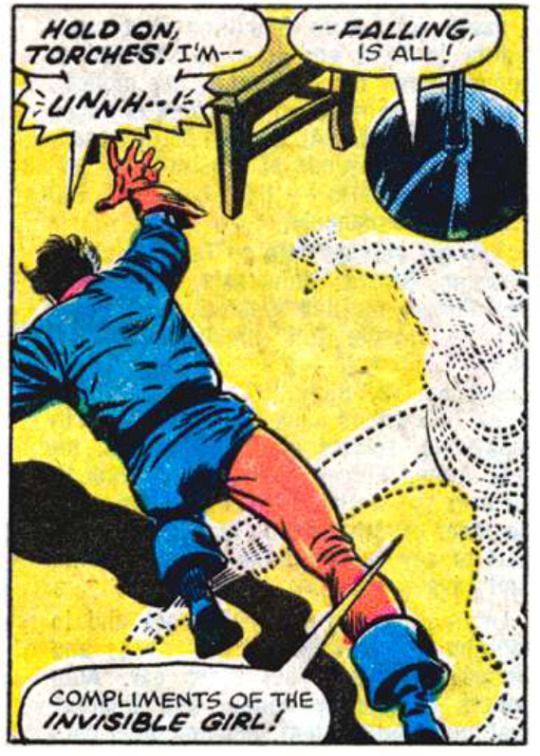
[10:17 PM] maxwellelvis: Reed does the same, dousing the Torches and getting everyone to cool off.
[10:18 PM] maxwellelvis: So the FF explain who, what, where, when, and why, a French Resistance liaison confirms that something rotten is up in Castle Cherelle, especially that the operation there is being overseen by one Baron Heinrich Zemo.
[10:19 PM] Wack'd: ...was this really their catchphrase
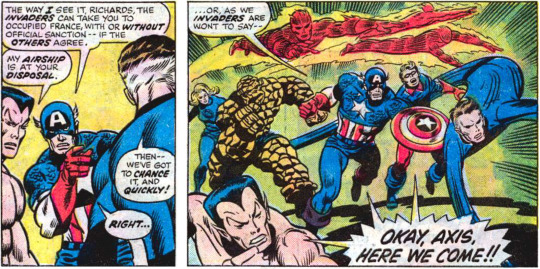
[10:19 PM] maxwellelvis: Probably?
[10:19 PM] Wack'd: Hehehehe
[10:19 PM] Wack'd: What dorks
[10:19 PM] maxwellelvis: I've not read much Invaders, but it seems like they're trying to channel the spirit of the All-Winners Squadron
[10:20 PM] Wack'd: Every comic book website ever uses it as a headline when there's Invaders news
[10:21 PM] maxwellelvis: So, they make it as far as France in one of Namor's airships, but are ambushed by Stukas. Toro is even more hotheaded than Johnny and wants to go out and flash-fry them, but Hammond tells him to stand down, they can't afford to give away their position to Zemo before they even reach the castle.
[10:21 PM] Wack'd: This is even dorky or when you consider that the Invaders are an invention of the mid-century war comics scene
[10:21 PM] Wack'd: And not a team that ever actually existed in the 40s
[10:21 PM] maxwellelvis: Well, the All-Winners Squadron I think was a thing, not sure if they ever all teamed up though. It might have been before the JSA.
[10:22 PM] Wack'd: Oh! Yep
[10:22 PM] Umbramatic: oh huh
[10:22 PM] Wack'd: Line-up did have Cap, Bucky, Namor, Toro, and Human Torch back in the 40s
[10:23 PM] maxwellelvis: Just before the reach the castle, we get a shot of the Watcher's face in the clouds, indicating that yeah, they're on the right path. Bucky gets creeped out by it. Ben just feels even more nervous now.
[10:23 PM] Wack'd: The name "Invaders" is a flagrant retcon though, as is the absence of Whizzer, Miss America, Blond Phantom, and Angel
[10:23 PM] maxwellelvis: Miss America is elsewhere now. More on that later.
[10:24 PM] maxwellelvis: Anyways, they land mostly undetected, have time for a character bit or two, and split up to cover more ground
[10:24 PM] Wack'd: Well hang on!
[10:24 PM] Wack'd: Don't gloss over character bits! Love character bits!
[10:24 PM] maxwellelvis: Ahh
[10:25 PM] Wack'd: Oh this is just exposition
[10:25 PM] Wack'd: Moving on
[10:25 PM] maxwellelvis: Reed realizes that while they're here, he and Ben are also just now signing up and gets goosebumps, which is rare for him.
[10:25 PM] maxwellelvis: Namor professes his hatred of stealth tactics, showing yet again why he will be a Good King
[10:26 PM] Wack'd: (So long as I'm tracking when the sliding timescale kicks in, the fact that Reed and Ben are still WWII vets is probably worth noting)
[10:26 PM] maxwellelvis: Speaking of which, Reed also gets weirded out at teaming up with a younger Namor and scolds himself for playing Jealous Husband
[10:26 PM] Wack'd: And Sue is apparently still a bit hot under the collar
[10:27 PM] Wack'd: viagra joke
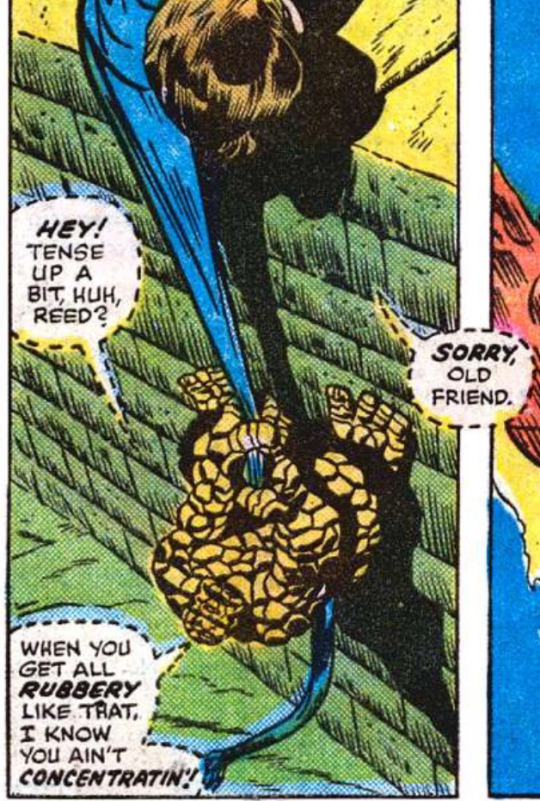
[10:27 PM] maxwellelvis: I can't blame her here. Dude just refuses to age. How DARE he be so good looking for so many decades?
[10:27 PM] Wack'd: The Face of Beauty
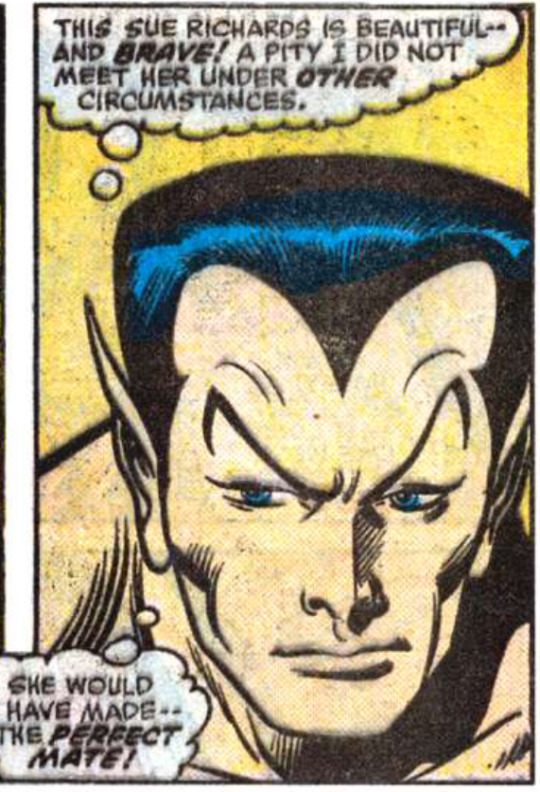
[10:28 PM] maxwellelvis: The Torches all team up and it's... interesting at least in black and white to see how the pencils and inks try to make three guys with the same power all look distinct.
[10:28 PM] Aleph Null: sue was a star trek fan and really liked spock
[10:28 PM] Aleph Null: that's what i'm going with
[10:28 PM] Wack'd: Historically what happens here
[10:28 PM] maxwellelvis: How does it look in color, Wack'd?
[10:29 PM] Wack'd: Is that Johnny is stuck with the all-red-with-stripes look, while Jim looks like actual flames are coming off him--in accordance with how he was drawn in the 40s
[10:30 PM] maxwellelvis: And Toro has that look even moreso, at least here.
[10:30 PM] Wack'd: I'm going to be completely honest, in this issue, I can't tell any of the three apart
[10:30 PM] maxwellelvis: So Namor and the Richards' bust up a weapons plant.
[10:30 PM] Wack'd: It's all down to dialogue quirks
[10:31 PM] maxwellelvis: He floods the place in his temper.
[10:31 PM] maxwellelvis: Skipping over that because the NEXT part is fun.
[10:31 PM] maxwellelvis: We get to revisit the events that lead up to Cap getting frozen and Bucky's "death"
[10:32 PM] maxwellelvis: Johnny's turn to get the willies as he realizes who these two guys are and what's going to happen to them, things he can't try to prevent or risk more damage to spacetime
[10:34 PM] maxwellelvis: So they bust up central ops, then Cap has a confrontation with Zemo. The shield shatters the tank full of Adhesive X, trapping Zemo in his hood for the rest of his days, though in this retelling, Cap actually tries to help Zemo, who refuses and says that not only can nothing get it off him, but he'd rather die than surrender, or better yet, he'll just kill Cap.
[10:35 PM] maxwellelvis: Zemo escapes down a tunnel and though Johnny CAN keep up with him, he simultaneously CAN'T because he has no way of knowing if the escape tunnel is booby-trapped and so he loses Zemo in his hesitation.
[10:35 PM] maxwellelvis: Meanwhile, Ben and the other Torches take out the V2 bay.
[10:36 PM] Wack'd: Yeah they're really going all in on the 60s look for all the Torches here
[10:36 PM] maxwellelvis: One of the missiles gets fired, with Ben on it. Jim and Toro can't keep up, but Ben manages to sabotage the missile in midair and steer it back to the castle and pull a Slim Pickens.
[10:37 PM] Wack'd: Just a little scruff of hair on the top to tell them apart
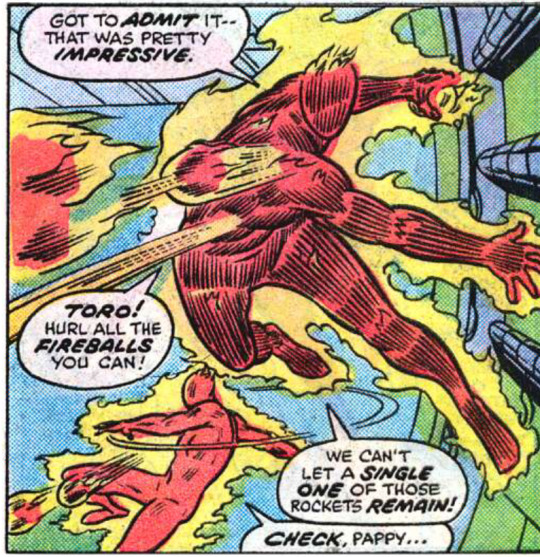
[10:37 PM] maxwellelvis: Which is weird because you wouldn't suspect that from just the lineart
[10:37 PM] maxwellelvis: which is what I have.
[10:37 PM] Wack'd:

[10:38 PM] maxwellelvis: "I thought I died an' went ta Heaven, but then how come I'm lookin' at YOUR ugly kisser, Stretcho?" They managed to get out in time and save Ben from scattering himself all over France.
[10:39 PM] maxwellelvis: And assuming that no Vibranium survived the explosion, all is well that ends well.
[10:39 PM] maxwellelvis: Well...
[10:39 PM] Umbramatic: something something dr strangelove
[10:39 PM] maxwellelvis: except Uatu is still in the Baxter Building
[10:39 PM] Wack'd:
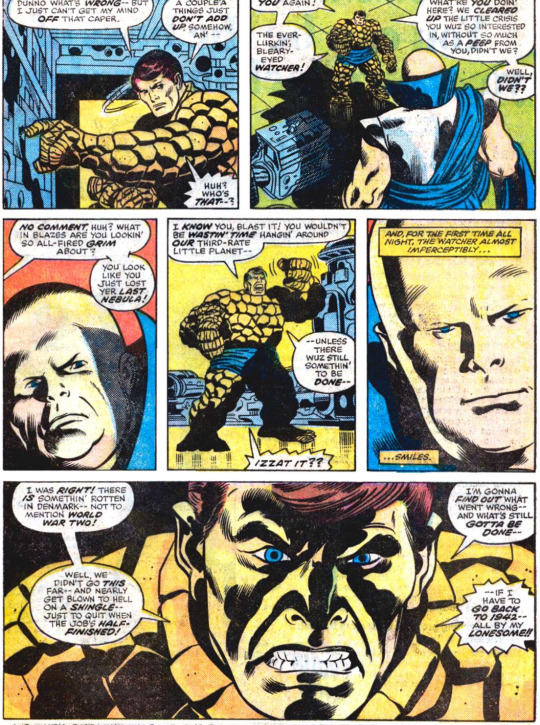
[10:40 PM] maxwellelvis: Ben realizes that, if the Watcher is still here, that means, that not all of the Vibranium was in the castle. Uatu says nothing, but subtly smiles, leading us in to Marvel Two-In-One Annual One
[10:41 PM] Bocaj: Dammit Uatu
[10:41 PM] Bocaj: And also the Watchers
[10:41 PM] Bocaj: Just your presence is interfering
[11:01 PM] maxwellelvis: Okay so, on to part 2 of this story:
[11:01 PM] maxwellelvis: MARVEL TWO-IN-ONE ANNUAL #1
[11:03 PM] maxwellelvis: I'll just get the highlights out of the way.
[11:04 PM] maxwellelvis: Whizzer. U-Man. Giant flying swastika. There's a guy called The Thin Man. Whizzer. The original Patriot. Ben throws himself off a flag pole. Roy Thomas shamelessly inserts himself into the story. Whizzer.
[11:05 PM] maxwellelvis: Also there's a superhero called Blue Diamond. For some reason I thought that's funny in 2019.
5 notes
·
View notes
Text
while i’m apparently still in confession mode for some dark reason:
after i told that awful story yesterday about the degrading one night stand that an older male friend spent a year bullying me into, i started thinking about all the cliches that are sold to us about the sexuality of precocious young women: what it means for us to navigate the devious emotional traps set out by the jealous and covetous world around us. what i mean is, there’s this whole gothic narrative that never stops circulating, involving beautiful, talented, intelligent, sensitive young women who are advanced enough to start exploring their own desires independently, but not experienced enough to identify the (typically) older male predators who hunt them. these men take advantage of their uninformed curiosity, leveraging their prey’s desire to grow up faster in order to control, possess, and abuse them. while this narrative is inherently criminal, society never seems willing to fully denounce it, preferring to preserve its erotic potency for a wide and slavering audience. the iconography of this narrative is mostly derived from Lolita–
[which btw our cultural failure to see that book as anything other than a “love story” is really disturbing and speaks volumes about our willingness to project our grossest ideas wherever we want, even when other interpretations (like “black comedy”) are abundantly available]
–a mature but fragile adolescent with that /special something/ innocently hypnotizes a genteel older man whose sophistication belies his uncontrollable animal desire for her, which is less His Problem than it is a natural response to her beauty and charm; a forbidden love affair ensues. when i was young, i swallowed this concept hook line and sinker, hoping it would happen to me some day! i hated dumb little boys my own age, and i felt that if some Humbert Humbert type were to flatter me with his highly curated attention, then i would know that i had truly arrived.
“sadly”, i made it through high school and college without ever knowing that validating thrill. i wasted the latter half of my 20s on an abusive relationship with a guy two years younger than me, who often argued that he should be allowed to wreck my life however he wanted because he was “less mature” than i was and deserved more leeway. as i turned 30, i met the extraordinary person i would marry. i felt a profound sense of relief, entering my 30s; i had finished with so many of my old delusions, and the pulverizing pressure to have The Time of Your Life throughout one’s 20s had finally lifted. i looked back on my youth, thinking of it as a period of dreary, pointless misery in which “nothing really happened”, good or bad. but recently, when i started to think about it with greater focus, i realized that some shit really DID happened to me. i had just completely ignored it, because i thought of it as the fruits of my own bad taste.
throughout junior high, i had a bizarre rapport with a guy in his early 20s–”nothing happened”, as they say, but this guy was sort of a freak and a loner, and i’m probably lucky that there wasn’t a lot of opportunity for something TO happen. then my supposed best friend, jealous of even this non-event in my sad little existence, forced a relationship with a 30 year old man out of nowhere, and competitively abused my ears with a lot of gnarly details about their horrible sex life. then in high school, my first two boyfriends were both pretentious manipulative dickheads in their 20s who really had no business bothering someone who wasn’t old enough to vote. some of my friends suffered from the same problem, though we all just felt like we were becoming independent young women or something. then there’s some other stuff with an older classmate who was abundantly aware of how emotionally unstable i was, and took appalling advantage of that for a long time, and i probably won’t ever be brave enough to talk about it. then in college i briefly “dated” a guy around 50 with whom luckily nothing bad happened before i got rid of him, but like, it really wasn’t cool, looking back–he made me feel incredibly obligated, and as he only informed me mid-stream, he was married with children. then i spent the rest of college getting dragged through the mud by a guy in his 30s who used his professional clout and well-honed manipulative abilities to “take my virginity” (a phrase and concept i hate, but which applies here), which he was very excited about; it would have been best if he had just abandoned me after that, as so many assholes do, because he then cultivated a long tawdry and extremely damaging soap opera between us, the only point of which was to make trouble for his actual girlfriend, who was ALSO much younger than him. and the end of college and slightly after, i developed another intense connection with a man a few decades older, who would never quite initiate a relationship, but who was insidiously manipulative and made me feel terrible when i eventually got a real (age-appropriate) boyfriend, as if i owed him something; i later found out he did the same thing to another girl that i know, who is substantially younger. the terrible one night stand, previously discussed, was just a gross little footnote to this disgusting history…
…but the thing is, i never, at any time, felt like i had taken part in the overheated archetypal drama that society has built up around may-december romances. i didn’t even see myself as a victim of the bad behavior of adults, of people who should and did know better; i just felt separate from the whole thing, even though i had fantasized about it so much as a kid. the thing is, at the same time that the Lolita narrative is inappropriately romanticized, it does provide an opportunity to see the girl as a potential victim, a Little Red Riding Hood who enters a perilous erotic negotiation with a Big Bad Wolf. because i didn’t see myself as the heroine of my own iteration of this overly familiar story, i didn’t recognize the degree to which i’d been exploited by people who knew to use my youth and inexperience against me. i just blamed myself. and the reason for all this is really sad: i simply didn’t feel attractive. in my mind, the vulnerable nymphet was always delicate, doe-like, elegant; clothes hung on her alluring frame in a way that created a dizzying paradox between her youth and her emerging maturity; she could dance, play music, or write touching poetry; she was preternaturally irresistible even to “good men”. she had to be liv tyler in STEALING BEAUTY (*barf*) or some shit; only somebody that compelling could star as the doomed princess in society’s well-loved fairy tale about statutory rape. personally, i perceived myself as ugly, awkward, socially burdensome, and most importantly, the kind of girl who should count herself extremely lucky to be the center of anybody’s attention, even temporarily. because i didn’t see myself as a damsel in distress who deserved protection and sympathy, i failed to spot my own victimization. i thought of my history of increasingly negative and abusive encounters with older men as a matter of bad luck, bad judgment on my own part, and ultimately, “the best i could do” if i wanted any kind of affection. so i guess the irony is that if i had identified myself as a desirable dolores hayes type, then yes, i would have been in serious danger of fetishizing my own mistreatment–but on the other hand, i would have had a more realistic framework for understanding the sinister thing that was happening to me. unfortunately, the other side of the misogyny coin–not the side that turns you into a sex object, but the side that excludes you from feeling sexually worthy at all–prevented me from noticing that that awful Little Red Riding Hood cliche had already happened to me several times over.
tl;dr - when misogyny convinces you that you have nothing to steal, then it’s hard to tell when misogynists are trying to rob you.
it’s funny to start recognizing this only now that i’m approaching 40. i see a lot of young women on tumblr heroically fighting to strike a balance between enjoying their kinks and avoiding the corrupt elements in their communities–all the while trying to stay aware of how their personal history and mental health plays into this drama. some of them are way farther along in that philosophical journey than i was at their age, and i really admire the work they’re doing. i’m writing this more for the ones who don’t even know that they’re already a part of this struggle, because they haven’t learned to see themselves as desirable enough to be included in it. that is to say, i wrote this for myself; but i have a sneaking suspicion that someone else out there needs to hear it, too.

This post brought to you in part by the very beginning of CABIN IN THE WOODS, which, while not a deep film in any way, features a salient moment in which College Girl #1 tries to tell College Girl #2 that the professor who took advantage of her is a scumbag, and College Girl #2 defends him, humbly and maturely replying: “I knew what I was getting into.” The blood freezes in my veins when I think of how many times I said something like this about someone who did not deserve my defense. If you got dicked over, literally and/or figuratively, by someone older, sober-er, and/or more experienced than you, then this is your gentle reminder that you really cannot be accused of knowing what you’re getting into.
9 notes
·
View notes
Text
More Quarantine Movies
Going to put up this log of what I’ve seen now, as some of the stuff I liked the most is leaving The Criterion Channel at the end of the month. I really don’t know if anyone gets anything out of these posts, these are mostly synopses and they’re maybe spoiler-heavy. Let me give you the gist of it now: Otto Preminger’s a really good filmmaker whose movies are really interesting, Jean Arthur’s a great actress who enlivens everything and is also in a bunch of good-to-great movies. Also, I didn’t write about it but I rewatched Death Race 2000, that movie rules, feels relevant to today’s politics, and is leaving Criterion Channel at the end of the month.
The Pawnbroker (1964) dir. Sidney Lumet
Based on novel by Edward Lewis Wallant, whose The Tenants Of Moonbloom was reprinted by NYRB Classics with a Dave Eggers intro. Also some of the earliest nudity in a mainstream American film. About the misanthropy of a holocaust survivor, living in New York City, and interacting with black people who vaguely feel like racist caricatures, in part because it’s a movie about a misanthrope told from his perspective. A ton of movies about race from this era feel dated, this feels legitimately edgy, which is a term that gets thrown around somewhat ironically now or viewed as a pejorative, like something trying to offend, this does feel like a genuine attempt to be honest and push things forward (I really was not expecting that nudity) but also doesn’t feel totally successful, definitely not particularly enjoyable.
Shockproof (1949) dir. Douglas Sirk
I haven’t seen Sirk’s later melodramas, this one intrigued me in part because the screenplay was written by Samuel Fuller, and it’s sort of a pulpy noir thing. A woman, fresh out of jail, ends up living with her parole officer who is trying to keep her on the straight and narrow and away from her criminal ex, but they end up falling in love. There’s a thing where the male lead’s younger brother talks about how the lady is beautiful that I sort of wish wasn’t in there, feels creepy to me. There’s a bit of a shift in the narrative with the third act, where the lovers end up on the run, the once-upstanding man now a criminal on account of love, but they are having the endurance of their love tested by circumstance, is one of those things where a story which felt somewhat unique over the course of its telling shifts into something more recognizable.
…And The Pursuit Of Happiness (1986) dir Louis Malle
I have watched most of Louis Malle’s feature films at this point, I believe, and had a vague curiosity about what his documentaries were like. This one, made shortly after he’d moved to the U.S. and married Candice Bergen (something that comes up in Susan Seidelman’s Smithereens, in that some prostitutes read aloud from a fashion magazine that discusses it) he made a film talking to various recent immigrants. He covers a lot of ground, covering people working as doctors, large communities living in housing projects and causing racial tension with black neighbors (who both resent the smell of the food they cook but also suspect they don’t know their rights as the property developers plan to evict everyone and have the projects demolished). By and large everyone spoke to believes in the notion of the American dream of working hard to get ahead. Malle also speaks to anti-immigration think tank people and border patrols. Nothing too surprising but a lot of ground gets covered in a short amount of time. If I didn’t learn anything I at least admired that it felt non-didactic. Anything with more of a point of view or an argument would probably be disingenuous were it to present itself as enlightening.
The Baron Of Arizona (1950) dir. Samuel Fuller
Based on a true story, although with fictionalized elements, about a dude (played by Vincent Price) who becomes a master forger to falsify land grants and claim the entire state of Arizona as his own. Not a great movie, though that’s an interesting story. I bet I could guess what elements were made up for the sake of making a movie out of it, it has this tension of being interesting and unbelievable (although unbelievable by way of rote moviemaking formula), but also the story takes place over an extended period of time and so has some of the structureless feeling of a biopic.
House On Haunted Hill (1959) dir. William Castle
I’m going to confuse this with The Haunting Of Hill House for my entire life, that’s just the way it is. This stars Vincent Price, who’s always great, doing the famous premise where a group of people meet up to spend the night at a haunted house to win money. Vincent Price has a contentious relationship with his wife, who’s openly contemptuous of him and wants his money. There’s a moment where everyone at the house party is given a gun, each in a coffin. There’s a few “twists” all sort of being of the “there was a rational, non-ghost reason for everything” although any of them individually sort of strain the limits of credulity as something that works as a hoax. Vincent Price is basically not the villain, so much as his wife is, although he’s such a ham that loves being creepy that this again strains credibility in that the conclusion of the movie plays against the style with which the previous action has been presented. An enjoyable viewing experience.
My Name Is Julia Ross (1945) dir. Joseph Lewis
This one’s about a woman, looking for work, who falls into a scheme that kidnaps her and puts her up in a mansion, where she’s kept drugged and basically is told to assume the identity of a woman who was killed. I found this one pretty nerve-wracking, as it’s pretty nightmarish, basically about psychological torture. I found this one under Criterion Channel’s Columbia Noir collection, but before these films were considered noir, they were thought of as melodramas, but it’s also sort of a horror film about being gaslighted. There’s a part where they remove a stairwell and try to trick her into falling down? What’s funny is that one of the things that sort of separates this from horror is how quickly it resolves, whereas later work would I think give the audience the satisfaction of seeing the villain be punished in some way, the ending that just goes “then everything worked out alright” ends up making the structure feel more like the whole movie’s reason for being is just to see the protagonist suffer.
God Told Me To (1976) dir. Larry Cohen
Did I write about this already? I watched that a few months ago. Pretty wild basis in seventies grit about people going crazy, committing murders, then goes to a weird/confusing place involving some sort of holy entity in human form, the police procedural aspect butting up against this strangeness which doesn’t feel entirely thought through, and is in fact sort of incoherent, makes for a movie that is, in fact, still pretty good and worth watching although a bit tedious by the end.
Zombi Child (2019) dir. Bertrand Bonello
This I guess just came out in America this year, to the extent that anything came out this year, in theaters, it coming to streaming is basically its release. The zombies in this are of the old-school voodoo sense, taken seriously as a system of belief juxtaposed against French colonialism, as a Haitian teen feels at odds with her circle of friends, flashbacks to Haiti occur. When you watch a bunch of older movies new movies just seem to be not as good. Bonello’s not a bad filmmaker though, he’s able to capture a sort of sensual aspect of particular moments and moods, just not in a way where they then coalesce into a narrative of shifting emotion.
Anatomy Of A Murder (1959) dir. Otto Preminger
This movie is close to three hours long. It has a Law And Order procedural quality, taking up much of its second half with a courtroom drama, where Jimmy Stewart does a proto-Unfrozen Caveman Lawyer routine. He’s protecting a man accused of murdering the woman who raped his wife. The subject was surely shocking for its time. It becomes pretty clear, extremely quickly that the husband is an abusive piece of shit, but the main thrust of the narrative is still tasked with following the lawyer trying to get him off. Lee Remick, from Experiment In Terror plays the beautiful and doomed wife, who flirts with Jimmy Stewart. Some of these interactions feel weird from a modern perspective, because Stewart’s reaction is like “Yes, you’re a beautiful woman and any red-blooded American male would enjoy looking at you, but it is my duty as a lawyer to paternalistically insist you cover up!” Preminger is sort of known for pushing the envelope, and this one has a lot more talking about sperm and Lee Remick’s vagina than you’d expect. One of the things that’s meant to be a “quirky character detail” is that Jimmy Stewart is into jazz- The score, by Duke Ellington, is great, but there’s also a pretty corny cameo by Duke Ellington where Jimmy Stewart sits in with him, a second pair of hands on the piano. Still, I guess it’s better that he physically appears in the movie than there just being a scene where it implies Duke’s music is played by Jimmy Stewart, as the music is way too good to just be a lawyer’s quirky hobby. George C Scott, from Hardcore, plays the legal expert on the other side. After being pretty long, there is this sort of abrupt, (although well-foreshadowed) downbeat ending, where the jealous and abusive husband flees town to avoid paying his lawyer and to go somewhere quiet he can beat his wife to death, but said ending is played for this “you can’t win them all I guess, shame about the lower classes” quality from Stewart, who is dead broke all movie but seems like he just enjoyed being able to do work for once, even if it’s for a total shitbag. Good movie! Feels thorny and interesting.
Bunny Lake Is Missing (1965) dir. Otto Preminger
This is even better. Great Saul Bass credits sequence too. A psychological thriller where the disappearance of a child gives way to the police not being able to confirm the child is real, and doubting the mother’s sanity, becoming pretty nightmarish, dreamy, and exhilarating by turns. Gets to a place of “huh, I wonder what is going on” and then when that finally resolves there’s a pretty extended sequence of silent escaping/hiding, which is, one of those things that films do really well and is super-satisfying. It plays out amidst this background filled with interesting supporting characters, who all, for the first half of the movie, feel like moving parts in this somewhat inscrutable narrative machine.
The Man With The Golden Arm (1955) dir. Otto Preminger
This one I don’t like. Stars Frank Sinatra, who I find annoying, as a recovering heroin addict who relapses again. While I normally like the sort of scenery-chewing supporting cast that shows up in Preminger things, I really didn’t Sinatra’s nerdy best friend, or his wife with Munchausen’s syndrome. While with the other Preminger movies there’s this feeling of a slow reveal of what the plot is with this one I feel like as soon as you know that Sinatra is out of rehab (which you learn pretty quickly) you can guess the movie will be about how he relapses and then tries to get sober for real.
The Human Factor (1979) dir. Otto Preminger
Preminger’s final movie, based on a Graham Greene novel, featuring Iman making her film debut. Movie is mostly about intelligence agencies seeking out the mole in their mist, with intentions to kill whoever it is once they’re certain. It stars Richard Attenborough, as the source of the leaks. Halfway through the story becomes interspersed with flashbacks about Attenborough and Iman’s romance upon meeting in Africa. Continues the habit of ending on a moment that maybe feels like it should be expanded upon or made more resonant.
Bonjour Tristesse (1958) dir. Otto Preminger
This stars Jean Seberg as a teenager being raised by a single father, David Niven, who’s kind of a cad/ladies man who’s very permissive with his daughter, who seems likely to grow up rich and spoiled and find another rich man to take care of her. Deborah Kerr plays the woman who Niven ends up falling in love for real with, and the conflict is then between this woman taking on a maternal role and a daughter who is resentful of this. Deborah Kerr is in Black Narcissus, a movie I love, and here she comes off as smart, the voice of reason. Seberg destroys her father’s relationship by taking advantage of his sort of innate desire to flirt and be liked by women, driving Kerr to commit suicide, and the whole film is then told in flashback by Jean Seberg a year later, as she flirts with boys but has a great sadness and emotional distance about her, which is both inherited and self-inflicted. I’m partly just writing these plot summaries as my way of remembering what these movies are about, but this one is nice because I get to account for complicated characters who are both pretty eminently understandable. I keep getting hung up on the fact that movies today now have a much dumber idea of what a female character is. Maybe it’s something as basic as the fact that, as people read less, it’s rarer for literary novels to be adapted? As I talk in terms of “less good roles for women nowadays,” which is a cliche, it’s obvious enough that bad roles for men follow, as everyone is only as good or interesting as who they’re playing off of.
It’s also funny to think, in this era of “comic book movies,” that very few artists can make a character come to life with body language and facial expression the way an actor can. “Literary” cartoonists like Dan Clowes or Tomine play into the mask quality drawing creates, generating inscrutability as part of their effect. Many of the biggest names in “noir” comics are removed from the melodrama elements of actor’s performance in favor of an aesthetic based on paperback covers, which makes for something far less lively. Meanwhile, Blutch is an amazing artist who would probably do a great job telling lively character studies in a genre form, but he’s way more preoccupied with these Godard-style interrogations of film’s cultural meaning.
Separate Tables (1958) dir. Delbert Mann
From the same year as Bonjour Tristesse, and also featuring David Niven and Deborah Kerr. Deborah Kerr’s good in this- while she is sort of uptight in a maternal way in Bonjour Tristesse, here she’s sort of crippled by repression her mother imposes on her. It’s a totally different character, but she remains defined by various manifestations of repressed energy; I would say she’s most known for playing a nun in Black Narcissus. She’s again opposite Niven in a sort of romantic context, though Niven’s character is meant to be a neurotic freak and he’s not really convincing in that capacity. I couldn’t really work out what the deal is with Niven’s character, he gets arrested in a theater, seemingly because he takes his dick out to show women? Or that’s how I interpreted what was being discussed, but he’s mostly defended by everyone except this lady you’re supposed to hate for how domineering and judgmental she is so maybe it’s something less bad. I honestly couldn’t figure it out because it seemed like the thing I was guessing they couldn’t talk about. This movie also features Burt Lancaster and Rita Hayworth as a couple that broke up once before and are reuniting now. This movie is pretty dull in a way I didn’t know whether to attribute to it being British or it being based on a play, as it feels extremely both.
Seance On A Wet Afternoon (1964) dir. Bryan Forbes
This one’s British too, and features the quality I recognize from British television, where the stars are not attractive, which always feels surprising. This one’s got a pretty great title, and a great premise. This woman, a professional psychic, convinces her husband to kidnap a child so she can comfort the parents and get publicity. The cinematography’s great. I got pretty nervous watching this, I think I am feeling more sensitive to movies as of late, way more willing to find things upsetting and nerve-wracking than usual. I can partly attribute this to the feeling of taking something in from a different cultural context, that leaves me unsure what to expect, but it’s also true that nowadays I sort of constantly have this feeling of “I don’t know how bad things are going to get” about the world in general, and it makes sense that I would apply that to films.
Only Angels Have Wings (1939) dir. Howard Hawks
Jean Arthur’s amazing in this - saw her the first time in The Devil And Miss Jones and then there’s this whole Criterion Channel featurette video running through what her whole deal is: This vulnerability/innocence crossed with an attempted toughness that really is very charming. Here she plays an entertainer just stopping briefly in town who gets hit on by some pilots, and develops feelings of impossible love for a man (played by Cary Grant) whose insistent toughness and refusal to show fear (despite having a dangerous job, of a pilot, that makes everyone who cares about him fall to pieces with nervousness). It’s this very universal type of entertainment, where there’s all these special effects shots of planes flying and a drama of men being men that’s nonetheless anchored by this love story, carried by the fact that Jean Arthur is very real and complex. She’s also a legit comedic actress, which I think makes her feel richer and more watchable than someone without a sense of humor would be. Rita Hayworth plays Grant’s ex, a woman who couldn’t take his daredevil ways but is now married to another pilot who has to do dangerous flights essentially to make up for an act of cowardice that got someone else killed. She’s got her own charisma obviously (and Cary Grant’s equally solid, in this sort of old-Hollywood glamor way) but Jean Arthur feels very alive in a way that carries the movie.
The Talk Of The Town (1942) dir. George Stevens
This one also stars Jean Arthur opposite Cary Grant, but it’s less interesting, partly because of a domestic setting and some stale-seeming comedy. Cary Grant plays Lionel Dilg, (great name!) who breaks out of prison and hides out in Jean Arthur’s attic, with a hobbled ankle, while a preeminent legal scholar moves in. There’s a love triangle between the three of them, and a friendship between the escapee and the scholar. Grant’s been unfairly framed for arson for political reasons by his boss for pointing out the factory where he works is a death trap. The people of the town are easily turned against this sort of leftist agitator by a last and biased judge. Insanely enough, there’s a movie called “The Whole Town’s Talking” also starring Jean Arthur but it has no relation to this one.
The Ex-Mrs. Bradford (1936) dir. Stephen Roberts
Upon realizing that many of these Jean Arthur movies were leaving the Criterion Channel at the end of the month, I started taking more in. This is a murder mystery, with screwball comedy accents, and again I’d say it’s really good, although the “comedy” premise wherein a woman sort of plows through the life of a man with no real respect for personal boundaries is the sort of thing that works in a movie even though it seems totally nightmarish when looked at from a certain angle. She writes mysteries, he’s a doctor, people are getting murdered. He is played by William Powell, from The Thin Man movies, which maybe these resemble. I guess the bickering couple that solves mysteries is a trope but it’s one that I don’t think has had any currency in popular culture since Moonlighting, which was in my lifetime but before I would have had any awareness of it. (I would probably enjoy it up until the point where I got bored of the formula.) I thought this was great and would make a good double feature with L’Assassin Habite au 21.
History Is Made At Night, 1937, dir. Frank Borzage
This has Jean Arthur in it too, but the reason I became aware of it was Matt Zoller Seitz tweeting about it. Partly this is because the description on the Criterion site is so bare-bones it barely seems like anything, but it turns out this is because the plot is completely insane and has a ton of twists and to talk about them very quickly veers into spoiler territory. It is, in brief, a love story. The first totally insane in it is the handsome male lead does the “drawing a ventriloquist puppet on his hand” thing and the woman’s totally on board. An element that doesn’t spoil the plot, but does seem somewhat incongruent with the tone, is there’s a French chef character for a comic relief. It’s really good. I’m pointing out the lightest element but the story’s villain is believably sociopathic.
Secrets (1933) dir Frank Borzage
Not nearly as cool or good. While History Is Made At Night feels like a cohesive story that’s just pretty crazy, this one feels divided into acts that have nothing in common with each other. First act is romance, between a rich man’s daughter and his banker. They run away together. I’m basically unsure of when this movie takes place timewise, the rich lady is wearing massive layered gowns I know would’ve been out of fashion by 1933. The second act is a western where they make a home together and have to fight off bandits! But the action is shot in a a pretty disinterested manner. Third act, I’m pretty on edge and bored, but the banker is now the governor of California and is having an affair with another woman, and they’re at a party together, and then the ending feels epilogue style as they’re both old as hell and they have fully-grown children and they’re talking about how they’re taking their leave of the kids to discuss their secrets. Female lead is Mary Pickford in her final film role. I guess this is a remake of a silent film, which was itself based on a play. Yeah this movie sucks basically.
Bitter Moon (1992) dir. Roman Polanski
Sure, I’ll watch a sex criminal’s erotic thriller that’s way too long. Hugh Grant is a married guy on a boat who has a French dude talk about all the sex he and his wife have because he knows Hugh Grant wants to fuck his hot wife. Said wife is played by Emmanuelle Seigner, Roman Polanski’s actual wife since 1989. This is a bad movie by pretty much any metric. It kinda feels like the social function of erotic thrillers is not to be a more socially-acceptable form of pornography, but rather to be pervy enough to remind the audience why you shouldn’t talk about sex publicly and have that be your whole thing. The French, of course, misunderstand this.
The Burglar (1957) dir. Paul Wendkos
Another noir, written by David Goodis. This one is a little formulaic, in terms of what you think of crime movies as being “about.” A burglar, who learned the trade from his adopted father, works with that man’s daughter to commit heists. His gang doesn’t like her. Once the two of them are separated, a corrupt cop seeking to steal a burgled necklace for himself tries to pursue a relationship with her as a means to an end, while a woman allied with him works on the burglar. A drive to New Jersey gets stopped by cops, violence quickly escalates to make the situation more dire. Members of the gang die. Not a bad movie but by no means essential.
My Brother’s Wedding (1983) dir. Charles Burnett
Criterion Channel removed the paywall for a bunch of Black-made independent films, this is one of them, Burnett’s follow-up to Killer Of Sheep. Seemingly starring non-professional actors, it’s about the conflict a guy feels as his brother is planning to get married to a rich woman he resents, and the loyalty he feels to a guy who just got out of prison who everybody hates. The main character is a good dude who wants to help out this pretty dangerous friend the best he can. The film captures his pride and resentment.
Dial M For Murder (1954) dir. Alfred Hitchcock
A few iconic-seeming shots of Grace Kelly in the role of a Hitchcock blonde, i.e. her standing at a phone while someone looms behind her about to choke her, and later standing traumatized. Suffers a bit from clearly being based on a play, with a ton of dialogue, particularly in the second act. The first act is able to provide this very particular type of satisfaction, where someone outlines a “perfect crime” in dialogue and then we see it play out and it falls apart and happens completely differently. It’s funny the criminal gives themselves away due to mistaking one key for another, because this sort of structure really does feel like a key fitting into a lock, things perfectly designed for one another, parceled out at the right time.
2 notes
·
View notes
Note
if you do write something about hawks n endwhore fighting to the death i wont read it cause a bitch WILL CRY about hawks dying (endwhore can choke) but i'll scroll really fast to the bottom of the fic to leave kudos bc your writing is that good
ty ty ty. I have like a few people who tell me they will rb or kudo my stuff even if they can’t read my work due to my subject matter ;w;. I’m sorry I keep writing stuff that hurts and I hope I one day write stuff everyone can enjoy…. ;A;
But actually, I’m gonna use this ask to talk more about Heroica, which is the hypothetical third installment in Veritas & Aequitas.
So, I think it’s no secret I despise Endeavor, but that’s not with an unwillingness to think or explore his character. In fact, he gets more vile from that - but he’s rather dimensional, you know?
I am writing a few metas with him involved (and Hawks, of course), and something I see on this side of the fandom, is an unwillingness to think or explore why Hawks admires him or, on narrative basis, why put Hawks with Endeavor at all (as a team up). However, given the fact that he also is very much trigger-laden as a character, I understand why people don’t explore him at all, as I myself have an issue with that as some who went through physical and mental abuse from my parents.Which I’ve written about before, but also, the reason I am thinking about it is because you can’t write Hawks growing to hate him without it if you do choose to?
And that relationship is so interesting, broken pedestals/never meet your heroes kind of thing. We had it with Inasa, but with Hawks I think it’d be far more personal, far more dramatic.With my Veritas/Aequitas story, there’s of course Hawks’s relationship (doomed with betrayal from the start) with Dabi that’s fueling it, but also…
Imagine how much anger Hawks would have if he knows what Enji has done to his family.
Hawks has nothing at this point in the story. He’s used as a sacrificial pawn, comes from impoverished circumstances where his parents thought little of letting him be a hero before he could probably read much, is so isolated from even his sidekicks because he has to be fast enough to save everyone. He just wants the luxury of free time to live, wants to be able to not feel trapped in something he never chose for himself. Endeavor had everything - never ending drive, wealth, power, and from far away, a perfect family.
Except he ruined that with his ambition and cruelty. Ruined it all just for… a one-sided rivalry.
As a hero, and a person, this should repulse anyone.
And certainly the Hawks I write; the Hawks I write wants so badly to be loved and accepted without having to be a perfect paragon, without having to constantly break himself for others, feather by feather. He’s a hero, but gosh, he wishes he wasn’t - he wishes he was incapable (in the end he can’t be anything but). He’s just a boy who wishes his familypeople loved him without him throwing himself off an overpass to stop a car crash first.So to see Enji just waste love and family like that…
And the shit that gets Hawks; Shouto, Fuyumi, and Rei….they’re willing to give him second chances. He’s hurt them beyond imagination, but they are willing to see what he could become.
Hawks will never get chances like that, not from anyone, which is why he was thrown to the wolves with the League infiltration. He has no one but the League now, and that was doomed because he was a traitor from the start and you can’t build things on false foundations.
What a fucking waste.
So, when Hawks fights him, he fights him knowing that Endeavor took everything Hawks could have wanted in life and ruined it. And yes, he’s jealous.
Jealous because he cares about the League, about Dabi but Dabi’s single-mindedly bent on destroying Enji, no matter if he gets destroyed in the end too. Jealous because Enji could hurt and harm people and still be loved and wanted when Hawks has only tried to help and save and ended up friendless and alone.
That’s basically what I would write in Heroica if I ever post it… those sorts of feelings.
32 notes
·
View notes
Note
Hi Lauren, you tend to be insightful about the Lannisters and their dynamics; what do you think it is about Jaime (despite his flaws) that means he was able to do what Tywin and Cersei can't/won't and just love Tyrion? Maybe it's Tywin and Cersei that are the anomalies, but it's almost surprising that Jaime managed to avoid absorbing their hateful attitudes to be able to have such a positive (until recently) bond with his brother, and wonder if it's like an unappreciated virtue of his.
What a good question!
I was going to type “I don’t think it’s about Jaime being a better person than Cersei.”
But the thought that immediately followed was, “No, Lauren, that statement gives the wrong impression of your views, because Jaime is a better person than Cersei in your opinion. Jaime has a dash more empathy and compassion than Cersei, and that gives him more potential. He is still horrible, but he is a marginally better person than Cersei, and the narrative suggests there might (might!) be hope for Jaime, when … there probably isn’t any hope for Cersei, unfortunately. That’s what GRRM is playing with throughout: Jaime’s potential, Jaime’s hope to be better than he is - will he end as the True Knight, or the Smiling one, or somewhere in between? GRRM isn’t playing with Cersei’s potential because, well, he cast her as the Evil Queen from the beginning. She’s a complex Evil Queen that we can empathize with, to be sure, but still definitely doomed.”
“But Brain, being marginally better than Cersei is a pretty low bar to set. If the shoe were on the other foot and Jaime were in Cersei’s place, do you think he would still avoid Cersei’s hateful attitude? Would he still have that sprinkling of empathy?”
“Nah, Tywin would make sure he adopted that hateful attitude.”
“Then what is it about Jaime?”
“Jaime is a marginally better person than Cersei, but I don’t think this is about Jaime being (or at least having the potential to be) a better person than Cersei. It’s not about Jaime’s inner conflict between the True Knight and the Smiling Knight, and it’s not about Cersei as the doomed Evil Queen.”
So let me explain what I do think it’s about – I think it’s about how much Tywin’s children have been affected by his abuse.
Jaime’s always had Tywin’s open (yes open!) (albeit limited!!) affection**. Meanwhile, Cersei lived for those secret smiles that were occasionally thrown her way.
**One might argue that we don’t see Tywin showing Jaime affection in the books, but I would argue that we do. I think Tywin is an ESTJ personality type, and one of the ways that ESTJs show love and affection is by giving you their time, which is very valuable to them. Less verbal, more action. Early on in the books, we learn that Tywin traveled across the continent to attend Joff’s (pre-series) nameday tourney and watch Jaime compete (and lose).
ESTJs make you a priority if they love you: “They have my son.” Tywin makes his priorities very, very clear in the War of the Five Kings.
Tywin is also a very concrete person; he gives elaborate gifts, because these gifts are tangible love to him imo. Hence the sword Oathkeeper.
Jaime and Cersei aren’t treated equitably. Jaime gets more imo. Jaime had more even in the very beginning (“alike as two peas in a pod … well, except between the legs”). So Jaime can afford luxuries like kindness and empathy and honor. They’re luxuries that Cersei can’t afford, or at least ones she doesn’t think she can afford, because Tywin basically threw her and Tyrion into the fucking Hunger Games with his abusive parenting.
(I have said it before that there is a terrible poverty in House Lannister.)
Cersei has to perceive Tyrion as a threat, and vice versa. It’s the win-or-die, zero-sum mentality she was raised with. Cersei didn’t gain the same distance from Tywin that Jaime did. While Jaime was off allegedly learning about honor and stuff with his Kingsguard parental figures, Tywin always kept Cersei close, first in the Tower of the Hand and then at CR, until she was handed off to Robert. So Cersei got a lot of exposure to Tywin’s horrible philosophies, and she was desperate to please her father, to gain his approval and earn his stupid smiles. I think a lot of Cersei’s reactions to Tyrion are behaviors learned from Tywin. Meanwhile Jaime’s off trying to establish his identity as a knight, independent of House Lannister.
And remember, Tywin kept Tyrion close too. Tyrion wasn’t allowed to go to the CItadel or anything to establish his own identity. Eventually he would forbid Tyrion a grand tour of Essos to keep him and continue abusing him.
It’s as if Tywin instigated a cage match between Cersei and Tyrion, to fight to the death, to see who could win the #2 spot. (And Cersei does indeed like to murder the competition; she takes after her father that way. (See: Melara)) Cersei has to compete with Tyrion for scraps of Tywin’s affection and approval.
Also, Jaime has never been forced to compete with Tyrion. Jaime was always going to be Tywin’s firstborn son and heir, if he wanted it, and he’s always been very secure in that position. (Too secure. Almost prison-level security that Tywin was forcing on him.) If Tyrion had been born able-bodied, it wouldn’t have changed Jaime’s life very much. Jaime never perceived Tyrion as a threat. (Until recently.)
And think about it. Think about how Tyrion never asked for Casterly Rock until ASOS, even though Jaime had been in the Kingsguard since Tyrion was, like, a first grader or thereabouts. When Tyrion finally asks in ASOS, he chides himself, telling himself he had known Tywin’s answer all along: “I never once raised the issue. I must have known. I must always have known.”
But loyalty plays a part too. Tyrion feels an intense loyalty to the “big, strong brother” who brought him “toys, barrel hoops and blocks and a carved wooden lion. He gave me my first pony and taught me how to ride him.” Jaime bought quite a lot of loyalty with a few trinkets, a pony, and a lie. (As I said: dividends.)
“You can’t be the Lord of Casterly Rock, he heard Jaime say again. And the stone kings were growling at him with granite tongues. You do not belong here. This is not your place.“
Obviously Jaime never said that to Tyrion, but I’m sure that Tyrion felt the same feelings as Jon Snow about his brother’s birthright. Remember, all dwarfs are bastards in their father’s eyes. I’m sure Tyrion, for a very long time, had this feeling that “Casterly Rock belongs to my brother, Jaime.” It’s only when Jaime is lost in the war that Tyrion finally asks for it.
(And tbh Tywin probably said that through the Casterly Rock PA system every morning with the day’s announcements, like, “And don’t forget … Casterly Rock belongs to my son, Jaime” the way Mr. Burns tells Homer Simpson “And don’t forget … You’re here forever.”)
But unlike Jaime, Cersei is in constant competition. If Tyrion had been born able-bodied, Cersei would have been pushed further down the line of succession, displaced by her second younger brother in both inheritance and her father’s affections. I think there’s a part of Cersei that glories in Tyrion’s dwarfism, because it feeds her own feelings of superiority. If Cersei never lets Tyrion (or anyone else) forget that he’s a dwarf, that makes her own position more secure. Tyrion must be cast down for her to be held up - zero sum. And Tyrion “killed” Cersei’s mother, in her eyes (and Tywin’s too, certainly). Cersei losing her mother puts her at a disadvantage, so Tyrion has to pay for that - again, it’s a zero sum game.
So I don’t really think there is some innate quality that Jaime has that Cersei lacks. Think about some of Jaime’s qualities. Like Cersei, Jaime is competitive, he gets violently jealous, he deals with threats swiftly and decisively, he can be ruthless. He’s still playing the zero-sum game that House Lannister must win or die. It’s just that, unlike Cersei, Jaime’s qualities haven’t been “activated” to target his siblings. Until recently perhaps. (If you’re thinking about, like, the Terminator or s/t right about now, my job here is done.)
I think that distance from Tywin (or the lack of it) is the characteristic we’re looking for.
It comes back to that kindness and empathy and love and all that jazz. Kindness and empathy and love are the basis of our humanity, which is obviously something that Tywin is lacking. (Cersei too.)
From his position of privilege, from the identity that he’s (in the process of) establishing in the Kingsguard independent of Tywin, Jaime can afford some glimmers of humanity. Jaime can do things like jump into a bear pit to save an innocent person, because he had other parental figures who tried to teach him about doing the right thing, instead of just Tywin preaching about Lannister glory.
Cersei never could afford those glimmers of humanity, not under Tywin’s Hunger Games parenting, always kept close by his side. tbh I don’t think Cersei would even think of humanity as something worth having, what with Tywin telling her stuff like ~love is useless~. Tywin stripped Cersei of her humanity long before the septas stripped her of her clothes, and Tywin warped her into something monstrous.***
And that’s what I find so … so remarkable about Tyrion. Tyrion still finds a way to afford moments of kindness, even when Tywin’s zero sum game says he shouldn’t be able to afford them. Remember, Tyrion was kept close too. Tyrion wasn’t allowed to establish his own identity. Tyrion too is eager for his father’s approval, eager to learn all the lessons Tywin might teach.
Tywin tried to take the humanity from Tyrion, but Tyrion is still fighting for it. He’s on the ropes in ADWD, but definitely still in the fight between man and monstrosity.
(I love all of my Lannister children with my whole heart, but this is why Tyrion is my baby, and this is why I think Tyrion is George’s favorite.)
***(Don’t get me wrong, Cersei is obviously still responsible for her own choices, and she is still to blame for the murders she committed and everything else. But I think Tywin is also a guilty party here.)
So. No, I personally don’t think there’s some unappreciated virtue about Jaime that allowed him to have a good relationship with Tyrion. It was his good circumstances from the beginning, that allowed him more freedom away from Tywin.
And something to consider: Jaime thought no one could love Tyrion. Jaime thought Tysha was lying about loving Tyrion, and he followed Tywin’s orders, and he still doesn’t feel remorse for Tysha. I said “glimmers” and I meant glimmers only. “I am loved by [Tyrion] for a kindness I never did.” How much does Jaime love Tyrion, truly? Like Cersei, Jaime too was eager to please Tywin and gain his approval, enough that Jaime was willing to lie and let this horrible thing happen. How much does Jaime love Tyrion, truly?
To me, the person with the unappreciated virtue is Tyrion. Where do these wells of kindness and humanity come from, amidst the parched desert of Tywin’s philosophies? What made Tyrion give the saddle plans to House Stark when House Stark met him with bared steel? Tyrion elevated his opponent, when he was already in a position of weakness. Why? That is the virtue to look for, because the fate of the world rests on Tyrion finding it, I’m quite certain.
***
Fortunately for all of us, I can express Tywin’s dynamic with Tyrion much more succinctly. (Although I could go on for days.)
“Tyrion hated weakness, especially his own. It shamed him, and shame made him angry.”
When Tywin looks at Tyrion, he is looking in a mirror, the only mirror in Westeros that shows him as he truly is: small. Weak. “an ill-made, devious, disobedient, spiteful little creature full of envy, lust, and low cunning.”
Tywin hates weakness, especially his own. He hates Tyrion, for cloaking all of Tywin’s weaknesses in Lannister crimson and “waddling” them about for all the world to see.
(Whenever I see people in the tags angry-ranting about quoteswapping, I laugh maniacally because I am the queen of quoteswapping. The parallels GRRM made between so many characters are too delicious to ignore.)
#mzyraj#replies#i dont think i answered this quite as well as i would like to sorry#but i have to stop now#lannister thoughts#tywin lannister#tywin meta#tyrion lannister#tyrion meta#jaime lannister#jaime meta#cersei lannister#cersei meta
240 notes
·
View notes
Note
Okay sooo am I the only one that was left confused by the balloon squad vs boy squad fight? I really don’t have the best assess to SKAM and it’s not unlikely that I missed something, buuut here’s my understanding of the situation: Elias punched Isak because Isak punched Mikeal. Okay makes sense, but Isak punched Mikael because he was....a little jealous? I have so many questions and am so confused.
Oh, anon, I’m really confused too! If I’m being totally honest, s4 makes very little sense to me and I don’t have great access to it either, but I will try to figure it all out for us. I have no idea if this mess of an answer even helps at all, but I tried. Maybe we’re just all doomed to be confused together forever. But let’s look at what we have.
So first, I guess, we should look at the circumstances.of the events around that fight and what all the characters say about it. This is Sana’s PoV and she has a bias, clearly. She believes the world is against her and all Muslims and that it will do whatever it can to discriminate against her/them. But in this instance, she’s the one who has the bias; she has decided that Elias and his friends fought and hurt Isak because they’re homophobic. It’s not clear why she feels this way, given that they were friends with Even, but I guess it’s possible that she saw the fallout of his attempt at kissing Mikael, the stuff he posted on the Bakka wall etc and decided they all fell out because the balloon boys were homophobic and not because of Even’s deep shame over what happened. She isn’t privy to Even’s thoughts and feelings, of course, and the fight would just reinforce this idea. Anyway, at the fight she believes she has Isak’s blood on her hands, metaphorically as well as literally because she was the one who brought the balloon boys to the karaoke bar and she was the one who allowed them to see Isak and Even being very close and this she was the one who unleashed the homophobia on them.
From the start, we have Sana, an extremely narrator in this instance, telling us what’s going on, so it’s no wonder it’s so baffling and opaque to us. Anyway, at the fight itself we see a lot of aggression. Mahdi is in the middle of it, there’s a lot of yelling, Elias spits and turns away, saying something about ‘kids’ - a clear reference to Isak. It was actually obvious to me from that moment that Isak wasn’t the pure innocent angel, but I wasn’t sure what was going on. It was just obvious that he must have been the instigator in some way just because Sana and the narrative were working so hard to prove he wasn’t. That doesn’t help us understand what did happen, of course, but it does help if we keep in mind that the narrative wants us to be confused at this point because it wants a big reveal moment. Yousef tells Sana that Elias is in a fight, again suggesting that Elias is the instigator and the issue, the one who needs to be stopped. We spend a lot of time from then on with Sana firmly believing that her brother and his friends are homophobic and trying very hard to make up for that to Isak. This serves to make the audience believe that Isak is innocent (and the idyllic walking to school with a flower behind his ear reinforces this) and to obscure the real events.
So, what were those real events? From Isak’s own lips your reading is correct: Elias stepped in because Isak punched Mikael and Isak punched Mikael because he was jealous. Now, why that might be is a little harder to determine. Isak hasn’t really been the type to seem jealous without good reason and in this case his reason was ‘Mikael was talking to Even’ which is a really really bad reason for a fight. However, there are hints in the past. First, Isak knows Even was Mikael’s ‘best buddy’ and that they were close, he knows there was a strong relationship there in the past. We also know that Isak is insecure and can be jealous of Even and his previous romantic experiences and the people he had those with (eg Sonja - she often makes Isak jealous and anxious; the first time they meet, when he sees her kissing Even at the party etc etc) and we have seen in a joking text that Even called Mikael ‘the previous man of my life’ which could have worried him; was he really that important to Even? If he’s ever back in his life could he usurp me again? Sonja came back and kicked me out once, why not this guy too? Isak probably doesn’t really believe that there was anything there, but it is possible that he’s heard rumors about Even kissing Mikael. He definitely gets told that Even did some things at Bakka, and there’s definitely no shock at Nissen that Even might be not-straight so rumors are a possibility. Isak is shown through the early parts of s4 to be curious about Mikael, and he has no reason for that unless he is wondering what that relationship was like. Now, do I find this particularly compelling? No, not really. But it’s possible that with these things in mind, and a few drinks in his belly, our hot tempered Isak (which we see both against Mahdi at the party in s3 and towards the homophobe in s4) might have seen Even talking to Mikael and got fired up. Personally, for me, this doesn’t seem credible but it’s a possible reason for his actions.
For me, wanting to protect Even makes more sense. He says he was jealous, but it could be a mix of that (they used to be close and will I lose him if they get close again and that conversation looks really intense, etc etc) and his protective instincts (this used to be his best friend, but he’s not anymore and Even’s been really unhappy when he talks about this time in his life and that guy’s here and Even was so upset on stage he stopped singing, and Even looks anxious over there etc etc) and so he punches in a misguided desire to protect Even.
The biggest issue, I think, is that in s4 this fight was there to serve Yousef’s story and not either Isak’s, Even’s or Mikael’s. So that’s why it’s all a bit nebulous and confusing: because it’s not actually important narratively for Sana or Yousef what the real reasons were. The important thing, from the story’s point of view, is that Sana is proven wrong about her brother and that Isak was the aggressor. So, the script hasn’t worried too much about internal consistency and the reasoning behind it. As far as the narrative is concerned, Isak knew about Mikael, Isak has been insecure about him, Isak saw him talking to Even, therefore Isak lashed out. It’s not really clear why the boy squad jumped in or why the other balloon boys did, except that these things do tend to escalate and with a few beers in them, the boys are unlikely to be thinking particularly clearly and to them it’s a case of ‘well he hit my friend, I need to help my bro out here’ rather than thinking about rights and wrongs and who started the whole thing.
I’m sorry I can’t be any more helpful than this. I find a lot of s4 rather baffling, and I’m not even sure if this is what you wanted to know, anon. But effectively … yes, the narrative says Isak did it from jealousy and you can squint at it and make a very slight case for how this could be.
#skam#my meta stuff#balloon squad and boy squad#Isak#no idea what I'm talking about but here we go anyway
10 notes
·
View notes